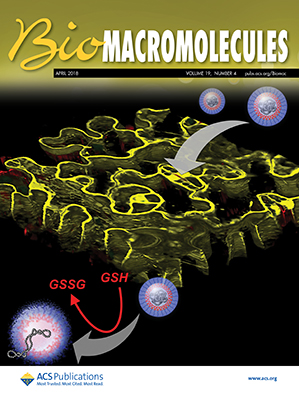通过反应挤压法将 Genipap 油用作可生物降解和低毒多孔吸收剂的天然交联剂。
IF 5.4
2区 化学
Q1 BIOCHEMISTRY & MOLECULAR BIOLOGY
引用次数: 0
摘要
从农用工业副产品中提取的蛋白质和一种天然交联剂(含有基因蛋白的基因油)被用来通过反应挤压法开发多孔材料,以替代化石吸收剂。加入基尼泊油后,生产出的轻质结构尽管具有多孔性,但却具有很高的盐水吸收率(超过 1000%)和竞争性截留能力。基尼泊交联材料的机械响应优于非交联材料,与使用商用基尼泊交联的材料相当。挤压产品具有血液相容性,可在 6 周内在土壤中生物降解。降解过程中产生的化合物不会对土壤产生毒性,并通过促进草的生长显示出较高的生物同化能力。研究结果表明,生物聚合物和新型绿色交联剂具有生产完全可再生的低生态毒性超级吸附剂的潜力。这项研究进一步促进了使用低成本蛋白质和连续加工(如反应挤压)生产这些吸收剂。本文章由计算机程序翻译,如有差异,请以英文原文为准。
Genipap Oil as a Natural Cross-Linker for Biodegradable and Low-Ecotoxicity Porous Absorbents via Reactive Extrusion
Proteins derived from agroindustrial coproducts and a natural cross-linking agent (genipap oil containing genipin) were used to develop porous materials by reactive extrusion for replacing fossil-based absorbents. Incorporating genipap oil allowed the production of lightweight structures with high saline uptake (above 1000%) and competing retention capacity despite their porous nature. The mechanical response of the genipap-cross-linked materials was superior to that of the noncross-linked ones and comparable to those cross-linked using commercial genipin. The extruded products were hemocompatible and soil-biodegradable in less than 6 weeks. The compounds generated by the degradation process were not found to be toxic to the soil, showing a high bioassimilation capacity by promoting grass growth. The results demonstrate the potential of biopolymers and new green cross-linkers to produce fully renewable-based superabsorbents in hygiene products with low ecotoxicity. The study further promotes the production of these absorbents using low-cost proteins and continuous processing such as reactive extrusion.
- Download: Download high-res image (208KB)
- Download: Download full-size image
求助全文
通过发布文献求助,成功后即可免费获取论文全文。
去求助
来源期刊

Biomacromolecules
化学-高分子科学
CiteScore
10.60
自引率
4.80%
发文量
417
审稿时长
1.6 months
期刊介绍:
Biomacromolecules is a leading forum for the dissemination of cutting-edge research at the interface of polymer science and biology. Submissions to Biomacromolecules should contain strong elements of innovation in terms of macromolecular design, synthesis and characterization, or in the application of polymer materials to biology and medicine.
Topics covered by Biomacromolecules include, but are not exclusively limited to: sustainable polymers, polymers based on natural and renewable resources, degradable polymers, polymer conjugates, polymeric drugs, polymers in biocatalysis, biomacromolecular assembly, biomimetic polymers, polymer-biomineral hybrids, biomimetic-polymer processing, polymer recycling, bioactive polymer surfaces, original polymer design for biomedical applications such as immunotherapy, drug delivery, gene delivery, antimicrobial applications, diagnostic imaging and biosensing, polymers in tissue engineering and regenerative medicine, polymeric scaffolds and hydrogels for cell culture and delivery.
 求助内容:
求助内容: 应助结果提醒方式:
应助结果提醒方式:


